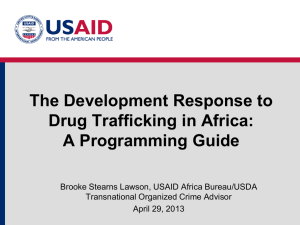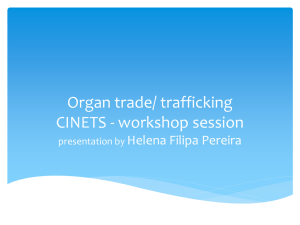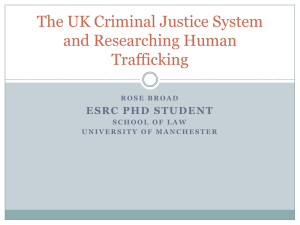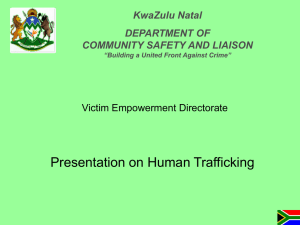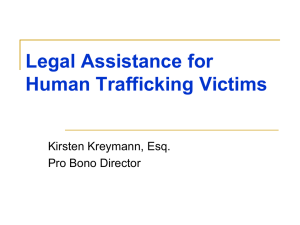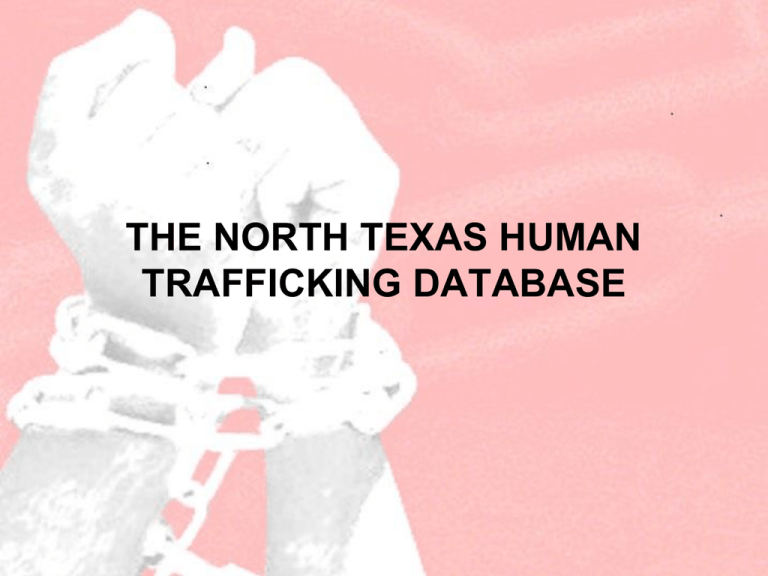
THE NORTH TEXAS HUMAN
TRAFFICKING DATABASE
The Embrey Foundation
Contracted Equip the Saints to build the
North Texas Human Trafficking Database
Specified the focus of the database to be
mainly the Dallas-Fort Worth area
The North Texas Human Trafficking
Database (NTHTD)
A listing of organizations and individuals
who engage in anti-human trafficking
initiatives in North Texas.
The work being done
Insight into the gaps in local anti-trafficking
efforts
Interviews
Three types of anti-human trafficking entities
were interviewed via telephone:
• 24 Nonprofit organizations: Founders or
Executive Directors if possible
• 13 Law enforcement agencies: Specific
departments engaging in anti-human trafficking work
• 16 Researchers and activists: Publishing on
human trafficking issues or involved in anti- human
trafficking activism apart from nonprofit organization
Questionnaires
Equip the Saints, with the assistance of
specialists in each area, created specific
questionnaires for the three focus groups
Data gathered from the three focus groups
included contact person, geographic
location, area(s) of work, activities, specific
needs, and recommendations for further
steps to end human trafficking
Coverage
Equip the Saints identified North Texas as roughly
consisting of the following counties:
•Bosque
•Collin
•Cooke
•Dallas
•Denton
•Ellis
•Fannin
•Erath
•Henderson
•Hill
•Hood
•Hunt
•Grayson
•Jack
•Johnson
•Kaufman
•Montague
•Navarro
•Palo Pinto
•Parker
•Rains
•Rockwall
•Somervell
•Tarrant
•Van Zandt
•Wise
Nonprofit
Organizations
Nonprofit Organizations (NPOs)
24 nonprofit organizations were interviewed.
• The majority works primarily in the North
Texas area
• Some work on a national or global scale
in addition to working in North Texas
Main Activities
Advocacy
Awareness
Conferences
Counseling
Demand-reduction
programs
Educational
curriculum
Empowerment
activities
Fundraising activities
Grant making
Internship programs
Job training
Legal services
Main Activities
Life skills programs
Mentoring
Networking
Outreach
Providing shelter for vicitims
Research
Social services
Transitional living assistance
Volunteer mobilization
Activity Focus
Most engaged in the supply-side of human
trafficking: work with victims and inform
public about human trafficking activity
Demand-side (reduction) activities include
awareness in high-risk areas, educational
seminars, funding for research, and
literature
Gaps in Coverage
Gaps in the coverage of human trafficking initiatives
mentioned by NPOs include:
• Help for minors
• Education for first responders and for law enforcement
• More emergency shelters
• Funding
• Survivor-centered service providers
• Street gang intervention
Gaps in Coverage
Foster Care System for reform
Homelessness issues
Greater partnerships between organizations
Training for public utility personnel (to identify
potential victims)
Immigration resources
Work in immigrant and minority communities and
with prostitutes
Victim restoration
Focus on the demand side of human trafficking
Needs
The main resource needs of NPOs:
• Housing for human trafficking victims
• Better technology
• Finances
• Research
• Translation services
• Volunteers
Policy Change Suggestions
Policy chances suggested by NPOs include:
• Decriminalization of victims
• Better and mutually-defined terms
• More research-oriented work to inform policy
Law Enforcement
Agencies
Law Enforcement Agencies
Equip the Saints interviewed:
• 6 police departments: Arlington, Dallas, Lewisville, Plano,
Red Oak, Sherman and Wiley
• 3 sheriff departments: Collin County, Dallas County,
and Denton County
• ICE/Homeland Security Investigations
• The Office of the Attorney General of Texas
• SAFVIC (Sexual Assault family Violence Investigator
Course) and TRIPLE (Training and Research Institute
for Professional Law Enforcement)
A number of other law enforcement agencies in North Texas were also contacted
Highlights
Equip the Saints’ interviewers found that:
• Some of the agencies stated that they targeted
human trafficking
• Departments handling human trafficking
include Vice/Narcotics, Covert Operations,
Child Exploitation Unit, the North Texas
Trafficking Task Force (NTTTF), and
Human Trafficking Unit
Highlights
• The majority of these had little experience in
dealing with trafficked individuals
• Few agencies were targeting prostitution or had
guidelines in place to handle minors in prostitution
• Most agencies worked with other North Texas law
enforcement agencies and a few worked with nonlaw enforcement agencies (NPOs)
Highlights
• Only one agency was working under a grant
• A few of the agencies focused on sex trafficking
while the majority had no specific focus
• The smaller law enforcement agencies had no
experience in or guidelines for dealing with
human trafficking
Needs
Needs of law enforcement agencies to assist
with human trafficking
• Full-time personnel dedicated to human
trafficking
• Translation and interpretation services
• Training
•Database of services for vicitms
•Services for placing trafficked children
Research and Advocacy
Researchers/Activists
Equip the Saints interviewed:
•16 activists
• 8 of them also identified themselves as
researchers currently focusing on human
trafficking
• Most of them were actively involved with one or
more nonprofit organizations
Research Topics
Current research topics include:
•
•
•
•
•
Community needs
Historical information
White collar crime
Foreign diplomats’ use of domestic forced
labor
How to keep workers from being
overwhelmed when working with trafficked
victims
Research Topics
• Aftercare for victims
• Domestic trafficking
• High-risk juveniles
• U.S./Mexico border trafficking
Gaps in Research
This group noted gaps in human trafficking
research including:
• Logistics to stop new traffickers
• Family members of victims
• Supply and demand in the area of forced
labor and economics
• Stopping trafficking as a global epidemic
Gaps In Research
• Sex trafficking demand solutions
• Victim amnesty
• Human trafficking as a national (U.S.) problem
• Relationship between prostitution and human
trafficking
• Faith-based and spiritual impact on human
trafficking
• Human trafficking among tribal and minority
groups
• Lack of dissemination of information
Activists
Activists were involved in many different initiatives
including:
•
•
•
•
•
•
•
•
Work with carious anti-human trafficking and
violence-reduction task forces and coalitions
Work with DNA Prokids
Prevention
Education
Outreach/Awareness
Aftercare
Legal services
Song writing
Policy Change Suggestions
Policy changes suggested by researchers and
activists include:
•
•
•
•
•
Law enforcement training
Teaching youth alternatives to the streets
Dealing with demand for sex trafficking
Definition of terms
Policies that embrace the faith community
Policy Change Suggestions
• Victim amnesty
• Licensing guidelines for residential homes
• Federal funding for safe houses
• Legal and social services for victims


